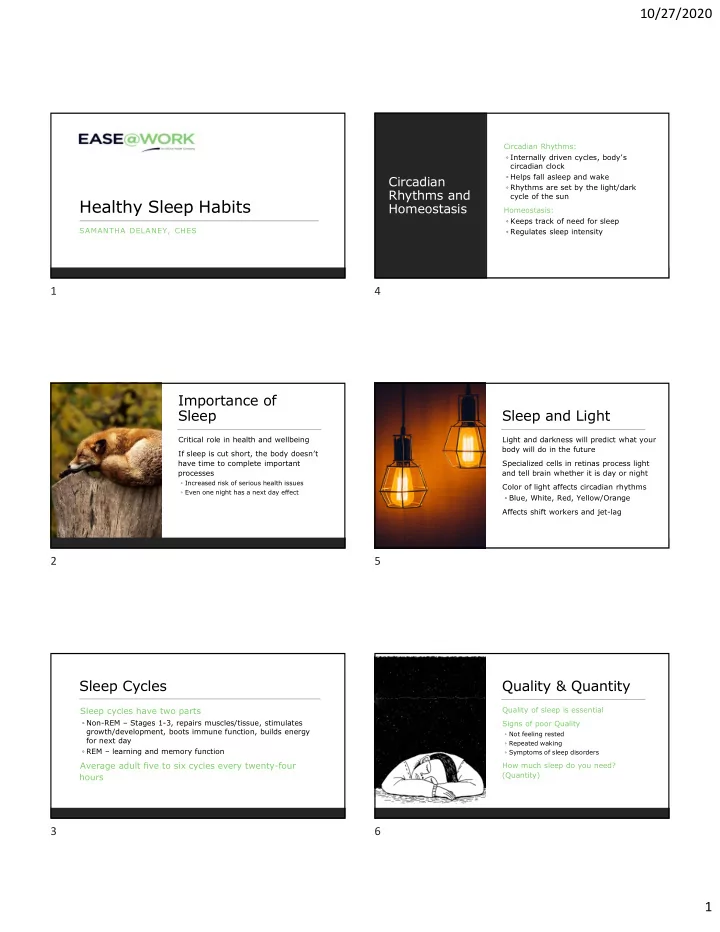

10/27/2020 Circadian Rhythms: ◦ Internally driven cycles, body’s circadian clock ◦ Helps fall asleep and wake Circadian ◦ Rhythms are set by the light/dark Rhythms and cycle of the sun Healthy Sleep Habits Homeostasis Homeostasis: ◦ Keeps track of need for sleep SAMANTHA DELANEY, CHES ◦ Regulates sleep intensity 1 4 Importance of Sleep Sleep and Light Critical role in health and wellbeing Light and darkness will predict what your body will do in the future If sleep is cut short, the body doesn’t have time to complete important Specialized cells in retinas process light processes and tell brain whether it is day or night ◦ Increased risk of serious health issues Color of light affects circadian rhythms ◦ Even one night has a next day effect ◦ Blue, White, Red, Yellow/Orange Affects shift workers and jet-lag 2 5 Sleep Cycles Quality & Quantity Sleep cycles have two parts Quality of sleep is essential ◦ Non-REM – Stages 1-3, repairs muscles/tissue, stimulates Signs of poor Quality growth/development, boots immune function, builds energy ◦ Not feeling rested for next day ◦ Repeated waking ◦ REM – learning and memory function ◦ Symptoms of sleep disorders Average adult five to six cycles every twenty-four How much sleep do you need? (Quantity) hours 3 6 1
10/27/2020 Recommended Hours of Sleep Per Age Group Day Newborn 0–3 months 14–17 hours (National Sleep Daytime Behaviors Foundation) No recommendation (American 2 Academy of Sleep Medicine) Infant 4–12 months 12–16 hours per 24 hours How Much What you eat and drink (including naps) Toddler 1–2 years 11–14 hours per 24 hours Regular physical activity Sleep Do (including naps) Preschool 3–5 years 10–13 hours per 24 hours Medications you take You Need? (including naps) Daytime schedule School 6–12 years 9–12 hours per 24 hours Age Evening routine Teen 13–18 years 8–10 hours per 24 hours Adult 18–60 years 7 or more hours per night 61–64 years 7–9 hours 65 years and 7–8 hours older 7 10 Stress Schedule Anxiety Common Depression Keep consistent! Causes of Medical conditions Set a bedtime Insomnia A change in work schedule Make adjustments in 15-minute increments Medications Shift work 8 11 Physical Sleep Hygiene Environment Use bed for only sleep and sex Healthy Sleep Habits lead to a good night’s sleep Quiet Ability to fall asleep and stay asleep Relaxing Cognitive Behavioral Therapy can help address thoughts and Cool temperature behaviors that prevent sleep Lighting 9 12 2
10/27/2020 Evening Routine Additional Tips Establish a relaxing bedtime routine Create relaxing, soothing sounds that send you to sleep. Avoid distracting noises. Limit bright lighting Get outside for 30 minutes every day. Sunlight/vitamin D helps Turn off electronics 30-60 minutes prior to bedtime regulate sleep cycle. Avoid large meals, caffeine, and alcohol 20-minute rule 13 16 Relaxation What To Practice good sleep habits Find short activities that Do if You help to de-stress If problems continue, speak with your Can’t doctor Try known techniques ◦ Breathing exercises Sleep Keep a sleep diary ◦ Guided imagery ◦ Progressive Muscle Relaxation 14 17 Aromatherapy Therapeutic use of essentials oils made from plant parts Questions? Used by being inhaled or applied to the skin Improved sleep and relief from anxiety and depression 15 18 3
Recommend
More recommend